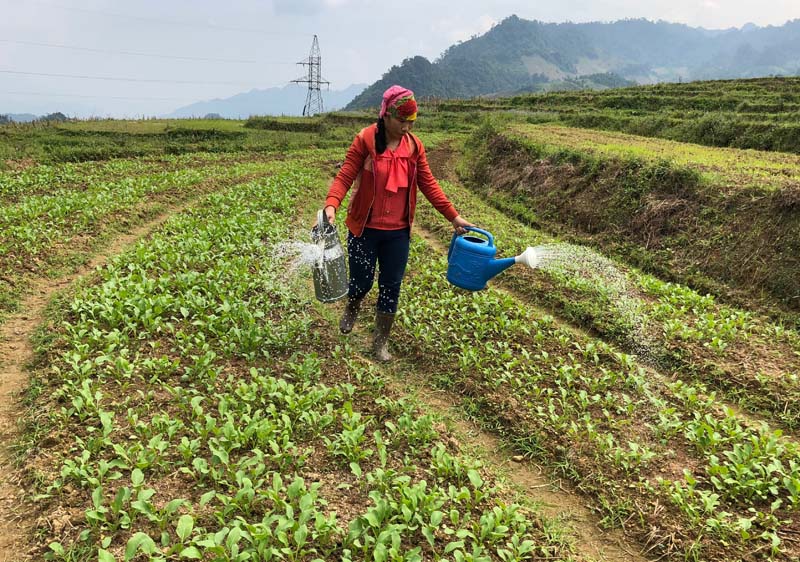
(HBO) - In recent years, mountainous communes of Mai Chau district have actively expanded vegetable cultivation areas. Approximately 80 percent of vegetable output of the district is provided for Hanoi, Hung Yen, Hai Duong, Quang Ninh, and Hai Phong.
In order to increase the supply chain of safe food in
general and safe vegetables in particular to protect consumers’ health, the agro-forestry-fishery
product quality management sub-department
selected Tan Son commune of Mai Chau district to build a safe vegetable production
and consumption model applying Vietnamese Good Agricultural Practices (VietGAP).

Member
households of the Tam Hoa Cooperative applythe VietGAP production process
in vegetable cultivation.
Carried out since July 2018, the model is joined by
the Tam Hoa agricultural service and development cooperative and ten vegetable-farming
households. In order to effectively implement the model, many measures have
been taken to upgrade and improve infrastructure facilities to meet VietGAP
requirements for vegetable cultivation. A training course was organised for 20
local residents both members and non-members of the cooperative.
In order to ensure the efficient and sustainable
development of the Tam Hoa agricultural service and development cooperative,
the sub-department has supported the establishment of the VietGAP board to coordinate
with the cooperative in developing a quality management system, which focuses
on quality policy and objective, techniques for chayote, choysum, cabbage,
spinach, and pumpkin farming.
The system also includes regulations on management and
use of seeds, cultivation land, fertilizers, plant protection products; harvesting
and processing; and handling violations in meeting VietGAP requirements.
The cooperative has signed contracts and memoranda of understandingfor supplying safe
vegetable products with a number of safe
vegetable trading establishments
in Hanoi, Bac Ninh and Hung yen provinces./.
Dao Village’s honey – a product certified with a 3-star OCOP (One Commune One Product) rating by Thong Nhat Agricultural Cooperative in Dao Village (Hoa Binh City) – is highly regarded by consumers for its quality, richness, and variety in packaging. The distinctively sweet taste of Dao Village’s honey leaves a lasting impression on anyone who has tried it.
In alignment with Project No. 07-DA/TU, issued by the Hoa Binh provincial Party Committee on November 1, 2021, Lac Thuy district has actively promoted investment and supported the sustainable development of its industrial and handicraft sectors during the 2021–2025 period. Alongside this, the district has remained committed to preserving and revitalising traditional craft villages.
Located in the northern part of Lac Thuy district, with a temperate climate and fertile soil, Phu Thanh commune has great potential and advantages in growing tea. The long-standing experience, combined with strict adherence to organic farming practices in the tea gardens, ensures that the dried tea products from Phu Thanh and Lac Thuy as a whole are sold out immediately upon production, providing a stable and prosperous life for the local people.
Amid efforts to streamline the administrative apparatus, Hoa Binh province has intensified measures to address challenges in land clearance, resettlement support, and infrastructure investment, aiming to speed up the progress of key projects.
Hoa Binh province has posted an unprecedented economic growth rate of 12.76% in the first quarter of 2025, marking its highest quarterly performance to date and positioning it as the second fastest-growing locality in the country, trailing only Bac Giang province.
Under current regulations, products in the One Commune – One Product (OCOP) programme that are rated three stars or higher must undergo re-evaluation every three months. However, in reality, some of these products fail to consistently meet the required standards, raising concerns about the sustainability of their OCOP certification. This underscores the urgent need for producers to enhance product quality and gradually develop their OCOP products into strong, marketable brands.



